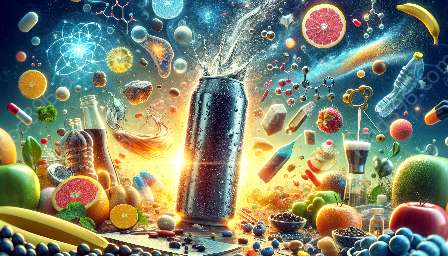Energizing, refreshing, and often controversial, energy drinks have permeated the beverage market and become a staple for many consumers. However, understanding their ingredients and health implications is crucial for industry professionals and health-conscious individuals. In this comprehensive guide, we explore the composition of energy drinks, their potential impact on health, and the broader implications for beverage studies and the food & drink industry.
Understanding the Ingredients
1. Caffeine: The primary ingredient responsible for the stimulating effects of energy drinks, caffeine is known to increase alertness and concentration. However, excessive consumption can lead to anxiety, insomnia, and heart palpitations.
2. Sugar: Energy drinks often contain high levels of sugar, providing a quick energy boost. Yet, excessive sugar intake is linked to obesity, diabetes, and heart disease.
3. B Vitamins: Many energy drinks contain B vitamins, such as B6 and B12, which play essential roles in energy metabolism. However, their inclusion in energy drinks has been criticized for potentially enabling excessive caffeine consumption without adequate awareness of the risks.
4. Taurine: This amino acid is commonly added to energy drinks for its potential role in enhancing physical performance. However, the long-term health effects of taurine consumption remain a topic of debate.
5. Guarana: Derived from a South American plant, guarana is a natural source of caffeine. Its inclusion in energy drinks adds to their stimulating effects, but the cumulative caffeine intake from both synthetic and natural sources can be concerning.
Health Implications
The consumption of energy drinks has raised numerous health concerns, ranging from acute reactions to potential long-term consequences. Some of the key health implications include:
- Cardiovascular Effects: The high caffeine and sugar content in energy drinks can lead to increased heart rate, blood pressure, and the risk of arrhythmias.
- Dehydration: Diuretic effects of caffeine can contribute to dehydration, especially when consumed in conjunction with physical activity or alcohol.
- Behavioral Changes: Excessive caffeine intake has been associated with anxiety, agitation, and irritability, impacting mental well-being.
- Substance Interactions: The combination of caffeine and other additives in energy drinks can interact with medications and other substances, posing risks to individuals with certain health conditions.
- Formulation and Innovation: Understanding the ingredients and their interactions to develop healthier and more sustainable energy drinks.
- Consumer Behavior: Investigating the motivations and preferences of energy drink consumers to guide marketing strategies and product development.
- Regulatory Compliance: Assessing the impact of health regulations and guidelines on the production and marketing of energy drinks.
- Health Advocacy: Exploring ways to promote responsible consumption and educate consumers on the potential health risks associated with energy drinks.
- Market Dynamics: Energy drinks have carved a significant share of the beverage market, influencing consumer preferences and competition among manufacturers.
- Health and Wellness Trends: The heightened awareness of health implications is driving demand for alternative energy-boosting beverages with cleaner ingredients.
- Brand Reputation: Companies in the energy drink sector are under scrutiny for their marketing practices and product safety, affecting their brand image and consumer trust.
- Social Responsibility: The industry is facing pressure to address public health concerns and promote responsible consumption through proactive measures and transparency.
Implications for Beverage Studies
The study of energy drinks is highly relevant in the field of beverage studies, as it involves examining their formulation, market trends, consumer behavior, and regulatory considerations. Key areas of interest include:
Impact on the Food & Drink Industry
The popularity and controversies surrounding energy drinks have broader implications for the food and drink industry. Some of the key considerations include:
Conclusion
In conclusion, energy drinks are a complex and polarizing category within the beverage market. Understanding their ingredients and health implications is imperative for industry professionals, researchers, and consumers alike. By addressing the potential risks while exploring opportunities for innovation and responsible marketing, the food and drink industry can navigate the evolving landscape of energy drinks while prioritizing consumer well-being.


















